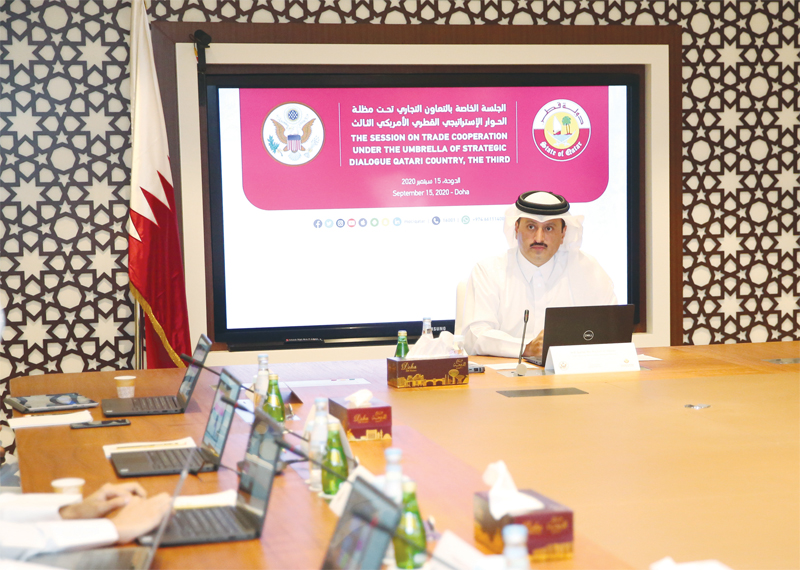
Undersecretary of the Ministry of Commerce and Industry, Sultan bin Rashid Al Khater (centre), chairing the digital session on commercial cooperation which was held within the framework of the third Qatar-US Strategic Dialogue, yesterday.
Qatar’s industrial sector has witnessed an increase in the number of operating factories to 915 as of September. Foreign investors may tap into the country’s infrastructure projects related to the FIFA World Cup 2022 and as well as opportunities in a thriving industrial sector, Undersecretary of the Ministry of Commerce and Industry, Sultan bin Rashid Al Khater, said yesterday.
He was chairing the digital session on commercial cooperation which was held within the framework of the third Qatar-US strategic dialogue.
During the event, Al Khater called for further bilateral cooperation to address the current economic challenges, and said he looked forward to organising the second Economic Roadshow in the US.
He added that Qatari, US trade relations have gained considerable momentum since the signing of the Trade and Investment Framework Agreement (TIFA) in 2004, with total trade now eight times more than it was 16 years ago and twice the value of 2017.
The session was also co-chaired by Ian Steff, Assistant Secretary for Global Markets and Director General of the United States and Foreign Commercial Service and Peter Haas, Principal Deputy Assistant Secretary for Economic and Business Affairs, and attended by a number of diplomats, ambassadors, senior officials and representatives of various governmental bodies and agencies from both countries.
Speaking about bilateral investments between both countries, Al Khater said US firms are increasingly active in Doha, noting that American companies have been operating in Qatar for decades, and have been critical partners in the nation’s development.
He also lauded the agreement signed between Widam Food Company and Tyson Fresh Meats for supplying protein in the global food and agribusiness sector, saying it represents an important step and provides an example of the rewarding cooperation between Qatar and the US.

Touching on the reforms that Qatar has undertaken in recent years to bolster its investment environment, he said the country has been able to rapidly diversify local and global supply chains while stepping up efforts to improve its logistics networks to become one of the most advanced digital and logistical systems worldwide, connecting companies to global supply chains through advanced communications and transportation infrastructure.
He added that Qatar has managed to maintain a resilient, diversified and globally connected economy, offering US investors key incentives to tap the Qatari market.
Touching on Qatar’s legislative environment, Al Khater said the government has been keen on developing laws and regulations that incentivise investments. These include the law regulating the investment of non-Qatari capital in economic activity, which allows foreign investors up to 100 percent ownership in various sectors and economic activities, in addition to many other competitive advantages such as the freedom to transfer profits in any convertible currency. He added that Qatar has established an Investment Promotion Agency to streamline procedures and provide support to foreign investors, including US companies that may benefit from various investment opportunities in Qatar.
In line with its long-term economic diversification strategy, Al Khater said Qatar seeks to bolster its private sector. In this context, a law was issued regulating the partnership between private and public sectors. He noted that the law empowers the private sector to tap key opportunities fueled by Qatar’s growth and development.
Al Khater went on to reiterate Qatar’s keenness to strengthen cooperation with the US, particularly in the development of necessary frameworks to protect intellectual property and provide guarantees for investors.
He added that Qatar was also seeking to explore new investment opportunities that benefit the economies of both countries, including potential investments in US infrastructure projects. In his closing remarks, Al Khater said Qatar and the US have achieved a great deal since the launch of the Strategic Dialogue three years ago, adding that Qatar looks forward to capitalising on these special ties to explore the full spectrum of available business and investment opportunities, and to enhance its cooperation with the US across an array of sectors, despite the economic challenges that the world is currently facing.




